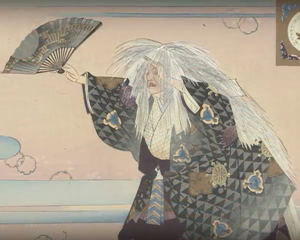Jars are embedded under the stage to help with acoustics and a pine tree is painted on the back wall.
他们把瓶子嵌入舞台下面来提升音响效果 还会在后墙画上松树
Okay, no not enough. No enough time for a pine tree.
好吧 不够 时间不够来画松树
Stage right stands a bridge called the Hashigakari also roofed. This is dotted with three pines representing heaven earth and man. This is where the main characters enter and exit.
舞台右侧有一个过道 叫“廊道” 有顶盖 有三棵松树做装饰 分别代表天、地、人 这里是主角入场和出场的位置
Noh theater doesn't have scenery. But actors wear beautiful costumes of embroidered silk and carry hand props.
能剧剧院里没有舞台布景 不过演员们都会穿着漂亮的有刺绣的丝绸服装并手持道具
The fan is the most important object as it can symbolize rain, wind, the sun, the moon and a lot of other things.
扇子是最重要的道具 因为它可以用来象征雨、风、太阳、月亮以及很多其他东西
A three or four person Orchestra called the Hayashi sits at the back of the stage dressed in samurai costumes.
拥有三到四名成员的乐队叫做“助兴乐” 他们会穿着武士服坐在舞台后面
Traditionally, the orchestra, a flute and two or three drums follows actors rhythms and movements.
乐队、长笛还有两三架鼓习惯上都是根据演员表演的节奏和动作来演奏的
In addition to the main cast, a six to ten person chorus sings, narrates and takes over the lines of the Shite when he's busy dancing, like the Sanskrit theater.
除了主演之外 会有一个六到十人的合唱团会在主角忙着跳舞的时候以唱歌的方式来叙述并接主角的台词 和梵语戏剧类似
Noh acting is highly gestural and codified.
能剧的表演里手势比较多 而且高度法典化
No actors train from the age of seven, there are no directors and nothing that we would recognize as Rehearsal. Rigorous training means the actors performances must be perfect every time.
演员们不会从小开始训练 没有导演 也不会进行排练 所以严格的训练便意味着演员们的表演必须次次完美无缺
Only the Shite are masked in most plays and that mask has one of five types: Agent, Male, Female, God or Monster.
大多戏剧表演里都是只有主角才戴面具 面具有五种:代理、男性、女性、上帝和怪物
Zeami who wrote more than 20 booklets explaining the philosophy and style of Noh said this about acting:
世阿弥写了20多本小册子来对能剧的哲学理念和风格进行阐释 他说过这么一段和表演相关的话:
Just as the transparent crystal produces fire and water, or a colorless cherry tree bears blossoms and fruit, a superb artist creates a moving work of art out of a landscape within his soul.
就如透明的水晶能生火水、无色的樱桃树能开花结果一样 一位高超的艺术家也能用他的灵魂来打造一件动人的艺术作品
According to Zeami, actors did this using three techniques: Monomane, meant identifying with and embodying the character. Yugen, meant lending that embodiment elegance while emphasizing the impermanence of life. And Hana or flower, meant and dowing the performance with spontaneity.
根据世阿弥的观点 演员们创造艺术作品需要用三种技巧:模拟表演,即认同角色、体现角色;幽玄,意思是在彰显优雅的同时要更加强调生命的无常;花,意思是表演要自然
So that even within those highly systematic style, a play would feel a little different every time.
所以 即使是高度系统化的风格 同一部剧每次给人带来的感觉也会不同
Noh were primarily court entertainments performed for aristocratic audiences.
能剧是宫廷娱乐节目 观众大都为贵族
But unlike other cultures, the Japanese mostly revered actors.
但不同于其他文化的是:日本的演员深受尊敬
During the height of Noh, many performers were even able to join the noble cast—the samurai.
在能剧的昌盛时期 许多演员甚至能够成为高贵的武士
Speaking of samurai, let's turn to our a tragic tale Zeami's Atsumori.
说到武士 我们来看一个悲剧故事 世阿弥的《敦盛》
A story adapted from the popular tales of the Heike.
这个故事改编自海克的通俗故事
A Noh thought bubble, No Problem.
一部能剧 思想泡泡 来吧

The play begins as the Waki or witness dressed as a priest enters via the bridge saying: "awake to awareness the world's but a dream. One may cast it aside. Is this what is real?"
戏的一开始 一个装扮成牧师的瓦克人或者目击者从廊道入场 说道:“醒醒,世界不过是一场梦,人们可以无欲无求,这是真的吗?”
Just in case the Buddhist influence wasn't totally clear.
很明显受佛教影响
The witness says his name used to be Kumagai, but now it's Rensho. He became a monk because he feels guilt over killing a young warrior—Atsumori.
目击者称自己以前叫熊谷 但是现在叫仁修 他出家当了和尚 因为他杀死了一名年轻的武士—敦盛 内心愧疚难安
Rensho explains he'll take a trip and pray for his soul.
仁修说自己会开启一段旅程来为自己的灵魂祈祷
He crosses the stage and his journey is complete.
他穿过舞台 然后旅程就结束了
Arriving at his destination, he sees the Shite, a flute playing grass cutter. Rensho marvels that a low-class person can play so well.
到达目的地后 他看到了主角 一个正在吹长笛的割草工 看到一个下流阶层的人竟然能吹一手好笛子 仁修感到特别惊讶
The grass cutter encourages him to be more woke. And they talk about flutes.
割草工告诉仁修要多警觉一些 之后他们开始谈论长笛
It turns out the grass cutter is a relative of Atsumoti. So he and the priests pray together.
原来割草工是敦盛的亲戚 于是他们开始一起祈祷
And now a pigeon interlude.
现在 一名贝亲入场
Where in the Waki asks a peasent to tell the story of Atsumori's death.
瓦克让一位农民讲述敦盛的死亡经过
Turns out Atsumori was ready to escape a battle when he realized he left his precious flute. Returning for it, he missed the last boat out.
原来 当敦盛发现遗漏了自己珍贵的长笛时 他决定临战脱逃 回去拿长笛 但是他错过了最后一班船
He met enemy warrior Kumagae who admired Atsumori's bravery and elegance, but killed him anyway.
他遇到了敌方的战士熊谷 熊谷很欣赏他的勇敢和不凡的气度 但还是将他杀了
And then the Waki is like: "that's me, I'm Kumagai."
然后瓦克说:“是我,我就是熊谷。”
In the second scene, the Waki prays before bed.
第二个场景里 瓦克在做睡前祷告
The Shite masked as Atsumori's ghost enters and dances.
主角戴着面具扮成敦盛的鬼魂进去跳舞
The chorus describes Atsumori's death and there's a moment where it seems like he'll take revenge on Rensho.
合唱描述了敦盛之死 有那么一刻他好像要报复仁修
But instead, he kneels and asks Rensho to pray for his soul.
但是并没有 他跪下来请求伦修为他的灵魂祈祷
In the hopes they'll both be reborn on a single lotus petal which is the Zen version of a happy ending?
希望他们都能在一朵荷花花瓣上重生 这是禅宗版的幸福结局吗?
Thank you, thought bubble.
谢谢 思想泡泡
So the moral of the story is that attachment is bad, even if it's two flutes.
所以这个故事的寓意是 不要太过恋物 就算是两支笛子也不行
And also don't underestimate grass cutters.
还有就是 不要小看割草工
We can see by its philosophical orientation, slow pacing and melancholy tone that Noh has a different feel than other types of theater we've encountered so far.
从能剧的哲学取向、缓慢的节奏和忧郁的基调我们可以看出能剧与我们迄今为止讲过的其他类型的戏剧都有所不同
But there's an even more important difference.
但是还有一个更重要的区别
Unlike so much of the ancient theatre we've been learning about, Noh is a living art form.
那就是不同于我们所了解的大多古剧 能剧是现存的的艺术形式
It is still performed today by troops who've inherited traditions passed down since Zeami's time.
直到今天仍有军队在表演能剧 他们继承了自世阿弥时代流传下来的传统
While it struggled in the late 19th and early 20th centuries. Now it's considered an essential part of Japanese culture.
而在19世纪末20世纪初能剧却举步维艰 现在它则被看成是日本文化重要的一部分
Well, it's time for me to take the hurry door.
好了 这集就要结束了
Next time we'll be heading to Italy where theatres briefly gets neoclassical and then gets rude.
下集我们会讲到意大利 那里的戏剧有过短暂的新古典主义倾向 之后会变得粗俗不堪
Until then, curtain!
下集见 闭幕!













